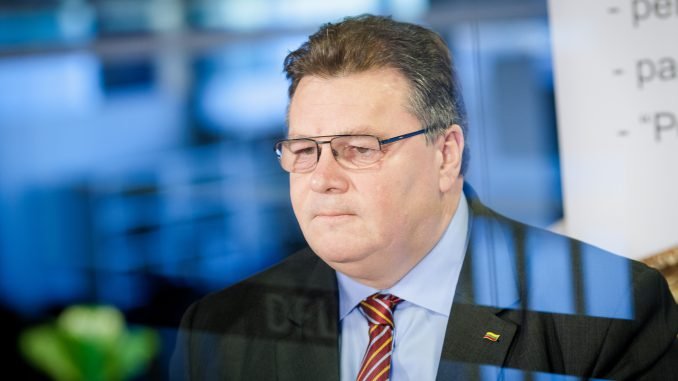
The discussion was co-organized by the MFA and The European Policy Centre (EPC), a Brussels-based think tank. The event was also attended by the US State Department’s Coordinator for Sanctions Policy, Ambassador Daniel Fried, Ambassador of Poland in Belgium Artur Harazim, Associate Fellow at Chatham House (Royal Institute of International Affairs) James Sherr, and representative of the European External Action Service (EEAS) Adriano Martins.
When speaking about critical factors for solution of the conflict in Ukraine, Lithuania’s foreign minister stressed that “it is about a principled implementation of the policy that we have previously adopted. The strategy is clear. Firstly, to work on the full implementation of the Minsk agreements; secondly, to maintain sanctions against Russia until the full implementation of the Minsk agreements; thirdly, to continue to support Ukraine,” said the minister.
According to Linkevičius, we cannot forget that it is not an internal conflict in Ukraine, which has already lasted more than a year, but Russia’s aggression against its neighbouring country. The Minsk agreements were adopted in September 2014 and in February 2015 in Minsk by all parties, including Russia, so this country had to fully implement them.
“If we suddenly start judging the success of the implementation of the Minsk agreements based solely on Ukraine’s achievements, while completely disregarding Russia, it will not bring peace to Ukraine, but rather the opposite. If this act remains unpunished, it can encourage the aggressor to continue such behaviour with the neighbouring country,” said Linkevičius.
According to Lithuania’s foreign minister, joint effort is needed to continue seeking the full implementation of the Minsk agreements. Among major requirements for Russia, the foreign minister named the withdrawal of Russian troops from eastern Ukraine, the withdrawal of weapons and the return of border posts to the Ukrainian government control.
Lithuania’s minister also underlined the importance of a link between the implementation of the Minsk agreements and sanctions against Russia. “We must maintain this link until the full implementation of the Minsk agreements by Russia. If not for the sanctions, if not for our unity – the unity of the EU, the Transatlantic unity with the United States of America, Canada and other countries in imposing and applying the sanctions, it is unclear whether we would have been able to stop Russia’s active aggression against Ukraine,” he said Lithuania’s.
“Finally, we must continue to support Ukraine, to look for ways to strengthen it. The application of provisions of the Association Agreement establishing a Deep and Comprehensive Free Trade Area (DCFTA) between the EU and Ukraine will begin on 1 January 2016 and that will take the country forward on its reform agenda. Now Ukraine will need our expert and financial assistance even more,” Linkevičius said.

Be the first to comment